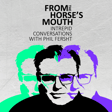
Episode 3: Artificial Control - Shelly Palmer, Professor of Advanced Media in Residence at the Newhouse School of Public Communications and CEO of The Palmer Group
In this provocative episode, Phil Fersht and Shelly Palmer, CEO of The Palmer Group, push the boundaries of the AI conversation, diving headfirst into the seismic shift triggered by reasoning engines.
Palmer, a trailblazer in the intersection of technology, media, and marketing, unpacks the radical changes reshaping the digital landscape. With the advent of AI systems capable of real-time reasoning and complex decision-making, we’re no longer dealing with mere tools - we’re cohabiting the planet with another form of intelligence. The implications are nothing short of revolutionary.
Palmer takes us through the next frontier in AI’s evolution, starting with OpenAI’s cutting-edge models, and explores how these advancements will transform industries, rewire human communication, and potentially disrupt the very fabric of society. They confront the darker side of this evolution - how AI’s unprecedented power can fuel misinformation, manipulate behavior, and blur the lines between reality and illusion in ways we’re not prepared for.
As the conversation deepens, Palmer and Fersht scrutinize the role of AI in shaping media narratives and political outcomes, especially as we face a future where AI-generated content could redefine elections and societal discourse. Palmer doesn’t hold back on his concerns about “artificial control,” where AI quietly dictates our actions, from the routes we take to the choices we make, without us even realizing.
The episode closes with a stark reminder: while AI opens up extraordinary new frontiers, it also demands a heightened level of awareness and responsibility. Palmer urges us to stay vigilant in guarding our human agency as this new intelligence becomes an undeniable force in our lives. This is not just an episode - it’s a call to action.












